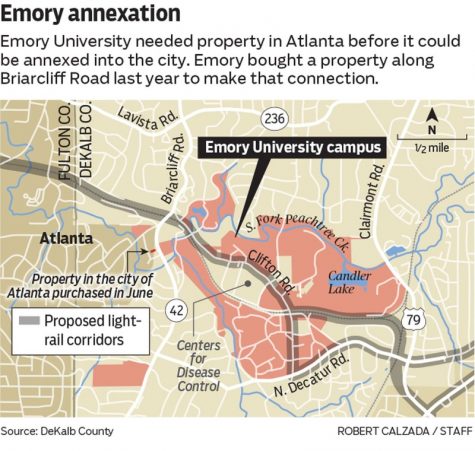DeKalb property annexation sparks debate
September 5, 2017

Recent opposition to the proposal to annex the properties of Emory University, the Centers for Disease Control and Prevention and the Children’s Hospital of Atlanta into the City of Atlanta is a lingering point of community contention.
State Representative Beth Beskin recently voiced concern that students in the proposed annexed area of Druid Hills in DeKalb County should become part of Atlanta Public Schools.
“For those who live within the city of Atlanta right now, about 60 percent of Atlanta taxes go to support the Atlanta Public School system,” Beskin said. “If this annexation were to occur and those brought into the city were not zoned to APS, it would cause dissension and distrust if there are Atlantans not paying taxes and not supporting the APS system, and it will lead to less cohesion within the city.”
The students living in this area will be affected by the changes to their neighborhoods brought by annexation and may also be impacted by legislation that would redistrict them. Currently, only nine students would be affected by rezoning if the legislation is changed to include the annexed property as a part of APS.
“As someone who lives right on the border of the property that would be annexed, I think that a great deal of opposition to the annexation itself comes from those worried that the historic district would be destroyed by the annexation,’’ said Kevin Jackson, a Druid Hills High School student. “As for students, as it currently stands, they would not be rezoned. This would be good because it would not force students to change schools and it would not impact our community by separating students living on the same road into different districts.”
As it stands, all properties that have zoned into Atlanta were rezoned for the Atlanta school system. Beskin points to this argument to justify rezoning to say that the issue is not just one of lack of cohesion within the Atlanta tax system but also an issue that breaks precedent.
“The impact of zoning these nine students into the Atlanta Public Schools district would be negligible for the district itself,” Beskin said. “Previous annexations, such as Edmund Park and Spring Valley Lane that have happened in the past couple of years, have been brought into APS. To date, there have been no exceptions that when territory comes into Atlanta it is part of the Atlanta Public Schools’ system. The Emory and CDC annexations should be handled in the same way.”
DeKalb County Commissioner Jeff Rader opposed the annexation prior to the properties’ requests to be a part of Atlanta proper that were sent over the summer. Radar thinks legislation should not force the properties to district students to APS.
“If you look closely at the Georgia Constitution, the law that an action by a city to annex a piece of property is not relevant to the provision of school services there,” Radar said. “This is a decision that needs to be made by the schools since they are an independent subdivision of the state of Georgia”.
Radar believes the APS system and the DeKalb County system should decide which system best fits the area, and the choice should not be left to the entire city.
The city is currently in the process of taking complaints on the drafted legislation into consideration. Melissa Mullinax, senior advisor to Mayor Kasim Reed understands that moving forward, the city will need to address the legislation in a manner that is in the best interest of Atlanta citizens.
“We are still having conversations and letting the arbitration process play out,” Mullinax said. “Any changes concerning APS or rezoning conditions made to legislation will be made after arbitration.”






